
The Death Rattlers, VMF-323, was destined to become one of the best-known U.S. Marine Corps fighter units of World War II, and the pilots who flew Corsairs for it are justifiably proud of their time. Albert Wells remembers his time with the Rattlers.
Death Rattler indoctrination
In 1943, I was a 21-year-old green Second Lieutenant when I joined VMF-323 at El Toro as a replacement. The original squadron had gathered earlier at Cherry Point where they began forming a Marine Fighter squadron called the Death Rattlers VMF-323. Unfortunately, they didn’t have any fighters: the early pilots had to learn fighter tactics in SNJ trainers before F4U Corsairs began to trickle in. The Squadron CO was a 23-year-old “boy” Major named George Axtell Jr. Although he was the same age as most of us—and the youngest CO of a fighter squadron in the Marine Corps—he was a no-nonsense commander who instilled discipline in all of us and made us the best damn Marine Fighter Squadron of the war! Although most of us feared him, and endured his wrath, he was a damn fine CO even though he placed me under arrest twice.
The first time was when we were training at Camp Pendleton and I came back with a bunch of wires hanging from the belly of my Corsair. By the time I landed, Major Axtell had received a phone call from a local farmer that one of his Corsairs was “flat-hatting” and snipped some wires. He asked what I did and I told him I must have flown between two mountaintops and sliced a wire—of course, he didn’t believe my bold-faced lie as I was confined to my bunk for 10 days.
Behind his back we called him the “Big Ax”—and boy, could he wield it when he was angry!
Esta historia es de la edición November - December 2023 de Flight Journal.
Comience su prueba gratuita de Magzter GOLD de 7 días para acceder a miles de historias premium seleccionadas y a más de 9,000 revistas y periódicos.
Ya eres suscriptor ? Conectar
Esta historia es de la edición November - December 2023 de Flight Journal.
Comience su prueba gratuita de Magzter GOLD de 7 días para acceder a miles de historias premium seleccionadas y a más de 9,000 revistas y periódicos.
Ya eres suscriptor? Conectar

Keeping 'em Flying!- The new generation of warbird pilots, restorers and mechanics
The new generation of warbird pilots, restorers and mechanics. Nearly 80 years after the end of World War II, the fighters, bombers, and trainers that defended freedom continue to enthrall and inspire audiences at airshows, thanks to generations of warbird pilots, maintainers, restoration specialists and collectors. In our September, 2022 issue we introduced you to the young warbird pilots, maintainers and restorers who are already beginning to displace more "experienced" warbird fliers and fixers.

The Corsair Maker- Bringing the Vought Corsair to the fleet was a daunting challenge that spanned nearly three years.
When the first production Corsairs exited the Stratford factory in June 1942, Guyton, as seen here, was tapped to manage the flight and production test program. Armament was improved to six wing-mounted .50s, displacing the wing fuel tanks now placed forward of the cockpit which necessarily was moved rearward by 32 inches. Overall length was increased, armor plate added, landing, arresting and tail gear improved, aileron control enhanced, and a new version of the R2800 engine was incorporated. But those significant improvements unearthed numerous idiosyncrasies that would take an extended period to make the Corsair acceptable for carrier operations
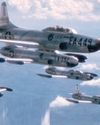
STARFIRES Over Korea
F-94 pilots tangle with MiGs
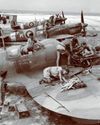
Training Mission
BY THE TIME THIS TRAINING SCENE WAS RECORDED in Canne, Italy, in July 1944, Allied Yugoslavian airmen had several years of experience working side by side with the RAF.
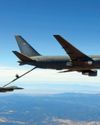
KC-46A PEGASUS
Next generation aerial refueler
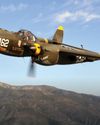
"SATAN'S ANGELS" ACE - Tales from a P-38 pilot in the South Pacific
\"AS A KID GROWING UP on the bow of my father's tugboat, hauling oil from Seattle to Alaska, I had a lot of time on my hands.
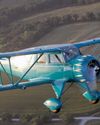
WACO YKC - Stunning and Ultra Rare Golden Age Cabin Flier
BETWEEN THE IMPLEMENTATION of the Air Commerce Act of 1926 and December 31, 1948, all U.S. registered flying machines sported an N-number, much as they do today, the \"N\" being an internationally recognized identifier for the United States. During that period, however, an additional letter-identifier followed the \"N.\" Depending on their category, they were registered in the NC (Commercial), NG (Glider), NL (Limited), NR (Restricted, usually meaning race airplanes), NS (State government), and, finally, NX (experimental).
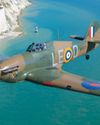
BADER'S HURRICANES
Double amputee fighter ace Douglas Bader and his Battle of Britain Hurricanes
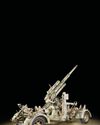
Scourge of the Allied Fighters
IT HAD TO BE THE MOST HELPLESS FEELING in the world: you're at 25,000 feet over Europe knowing that your primary function is to drop bombs-or flying escort for the bombers while being a slow-moving target for some of the world's finest shooters. However, you have John Browning's marvelous .50 caliber invention to give some degree of protection. Unfortunately, you're absolutely helpless against flak. Piloting and gunnery skills play no role in a game where sheer chance makes life and death decisions. For that reason, the Krupp 88 mm Flak 18/36/37 AA cannon could be considered WW II's ultimate stealth fighter. You never saw it coming.
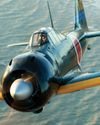
ZERO MYTH, MYSTERY, AND FACT
A test pilot compares the A6M5 Zero to U.S. fighters